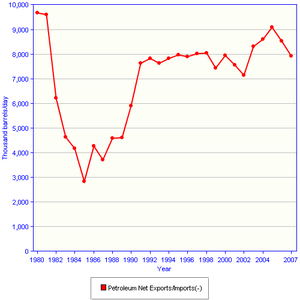
- Image via Wikipedia
REMEMBER “peak oil”? It’s the theory that geological scarcity will at some point make it impossible for global petroleum production to avoid falling, heralding the end of the oil age and, potentially, economic catastrophe. Well, just when we thought that the collapse in oil prices since last summer had put an end to such talk, along comes Fatih Birol, the top economist at the International Energy Agency, to insist that we’ll reach the peak moment in 10 years, a decade sooner than most previous predictions (although a few ardent pessimists believe the moment of no return has already come and gone).
Like many Malthusian beliefs, peak oil theory has been promoted by a motivated group of scientists and laymen who base their conclusions on poor analyses of data and misinterpretations of technical material. But because the news media and prominent figures like James Schlesinger, a former secretary of energy, and the oilman T. Boone Pickens have taken peak oil seriously, the public is understandably alarmed.
A careful examination of the facts shows that most arguments about peak oil are based on anecdotal information, vague references and ignorance of how the oil industry goes about finding fields and extracting petroleum. And this has been demonstrated over and over again: the founder of the Association for the Study of Peak Oil first claimed in 1989 that the peak had already been reached, and Mr. Schlesinger argued a decade earlier that production was unlikely to ever go much higher.
Mr. Birol isn’t the only one still worrying. One leading proponent of peak oil, the writer Paul Roberts, recently expressed shock to discover that the liquid coming out of the Ghawar Field in Saudi Arabia, the world’s largest known deposit, is around 35 percent water and rising. But this is hardly a concern — the buildup is caused by the Saudis pumping seawater into the field to keep pressure up and make extraction easier. The global average for water in oil field yields is estimated to be as high as 75 percent.
Another critic, a prominent consultant and investor named Matthew Simmons, has raised concerns over oil engineers using “fuzzy logic” to estimate reservoir holdings. But fuzzy logic is a programming method that has been used since I was in graduate school in situations where the factors are hazy and variable — everything from physical science to international relations — and its track record in oil geology has been quite good.
But those are just the latest arguments — for the most part the peak-oil crowd rests its case on three major claims: that the world is discovering only one barrel for every three or four produced; that political instability in oil-producing countries puts us at an unprecedented risk of having the spigots turned off; and that we have already used half of the two trillion barrels of oil that the earth contained.








